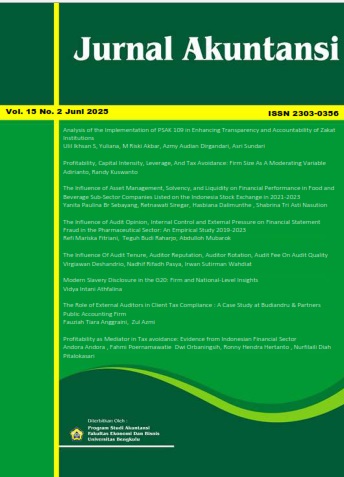Main Article Content
Abstract
This research investigates how profitability, capital intensity, and leverage influence tax avoidance practices, while also assessing whether firm size moderates these relationships. The research focuses on consumer goods companies listed on the Indonesia Stock Exchange (IDX) during the 2020–2023 period. This research adopts a quantitative approach with a causal-comparative research design. A purposive sampling method was used to select 120 panel data observations from 30 companies out of 63 consumer goods firms. With the help of SPSS version 22, the data were analyzed using multiple linear regression analysis and moderated regression analysis, preceded by descriptive statistical tests and classical assumption tests. The results revealed that profitability, capital intensity, and leverage together significantly influence tax avoidance, as indicated by a significance level of 0.046. Partially, only leverage shows a significant positive impact on tax avoidance, with a coefficient of 0.045 and a significance level of 0.027, whereas profitability and capital intensity do not demonstrate a meaningful effect. These findings confirm that companies with high levels of debt use interest expense as a tax shield to reduce tax liabilities. In addition, the results also show that firm size cannot moderate the effect of profitability, capital intensity, and leverage on tax avoidance.
Article Details
Copyright (c) 2025 Adirianto, Randy Kuswanto

This work is licensed under a Creative Commons Attribution-ShareAlike 4.0 International License.
Author retains the copyright and grants the journal the right of first publication of the work simultaneously licensed under the Creative Commons Attribution-ShareAlike 4.0 License that allows others to share the work with an acknowledgement of the work's authorship and initial publication in this journal
Author is able to enter into separate, additional contractual arrangements for the non-exclusive distribution of the journal's published version of the work (e.g., post it to an institutional repository or publish it in a book) with the acknowledgement of its initial publication in this journal.
Author is permitted and encouraged to post his/her work online (e.g., in institutional repositories or on their website) prior to and during the submission process, as it can lead to productive exchanges, as well as earlier and greater citation of the published work (See The Effect of Open Access).
Creative Commons Attribution-ShareAlike (CC BY-SA)
Jurnal Akuntansi is licensed under a Creative Commons Attribution-ShareAlike 4.0 International License.

